|
|
|
Sort Order |
|
|
|
Items / Page
|
|
|
|
|
|
|
| Srl | Item |
| 1 |
ID:
178247
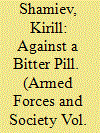

|
|
|
|
|
| Summary/Abstract |
From 2007 to 2012, Russian armed forces faced unprecedented changes that affected their structural, economic, social, and ideological elements. However, not all aims were fulfilled, and some changes were rolled back, despite the political and financial support from Vladimir Putin and Dmitry Medvedev for the defense minister Anatoly Serdyukov. Using the data from 11 interviews with former high-ranking military officers, scholars, and insider press workers, the research shows that the unsustainability of the reform was caused by the radicality of changes, the interest groups influence, and the technocratic policymaking in nondemocratic Russia. In addition, the research demonstrates the strategies the reformers used in order to overcome the resistance from mobilized interest groups. They had not succeeded, that ultimately led to the resignation of the defense minister, which stopped further radical changes in the contemporary Russian armed forces.
|
|
|
|
|
|
|
|
|
|
|
|
|
|
|
|
| 2 |
ID:
178249
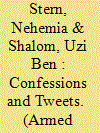

|
|
|
|
|
| Summary/Abstract |
This article explores the social media postings of Israel Defense Forces (IDF) soldiers on two different and unofficial Facebook groups. While scholars of armed forces and society have noted the growing importance that militaries have placed on digital media, there is little data regarding the unofficial uses and meanings that regular soldiers themselves make of social networking sites. With an anthropological focus on everyday experiences, we argue that the social media activity of IDF personnel highlights the quotidian aspects of military life in ways that reverberate beyond the strictly ideological or political facets of their service. Here, soldiers can express their frustrations with military bureaucracy, while also presenting a lighthearted (and positive) commentary on a shared rite of passage. This research opens a window into the lives and dilemmas of the first generation of Israeli soldiers to employ new media as a taken for granted aspect of their service.
|
|
|
|
|
|
|
|
|
|
|
|
|
|
|
|
| 3 |
ID:
178243
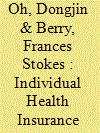

|
|
|
|
|
| Summary/Abstract |
In December 2017, Congress repealed the individual insurance mandate penalty. Given the poor health status of veterans, their higher demands for health insurance, and the substantial number of uninsured veterans, the repeal of the individual mandate should have a significant impact on the veterans. This article investigates how the repeal of the individual mandate effective in January 2019 is likely to affect the number of uninsured veterans and their enrollments in Veterans Affairs (VA) insurance. By analyzing 52,692 nonelderly veterans in Florida and California from 2008 to 2017, the findings suggest that the repeal will lead to a considerable increase in the number of uninsured veterans. Veterans who are unemployed, poor, and suffering disabilities are more likely to sign up for the VA insurance than better-off veterans. Thus, one of the important functions of veteran health care is to serve as a social safety net for vulnerable veterans. Thus, the Veterans Health Administration should establish a policy to minimize the expected negative repercussions of the repeal.
|
|
|
|
|
|
|
|
|
|
|
|
|
|
|
|
| 4 |
ID:
178246
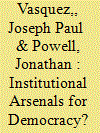

|
|
|
|
|
| Summary/Abstract |
Recent years have seen increased study of military coups. While this generally emphasizes coups as a dependent variable, there is a growing debate as to how coups influence a country’s long-term political trajectory. This literature includes a handful of studies that claim coups against authoritarian regimes can act for the public good and provide a boost to the state’s democratization prospects. Causal mechanisms have included factors such as aid conditionality, economic interdependence, and foreign pressure more generally. We argue that this growing body of work can benefit from increased attention given to those who carry out coups: the armed forces. Specifically, we argue that coups reflecting a larger societal interest, be it the removal of a dictator or the desire for democracy after a dictator’s ouster, are more likely undertaken by conscript armies. A cross-national exploration of over 170 coups suggests that conscript militaries are in fact significantly more likely to oversee democratic transitions following military coups. Beyond contributing to a broader literature on civil–military relations, the article points to important policy implications for developing nations.
|
|
|
|
|
|
|
|
|
|
|
|
|
|
|
|
| 5 |
ID:
178241


|
|
|
|
|
| Summary/Abstract |
It is widely accepted many health and mental health conditions experienced by veterans may be prevented or reduced in severity through early primary health-care intervention, yet research suggests high levels of health-care avoidance in this population. The aim of this study was to examine the meanings military personnel attached to health and how these impacted health-care utilization. To achieve this, 50 hours of primary interview data were obtained from 13 Australian Army combat personnel undergoing rehabilitation, which were thematically analyzed. Results support previous findings that engagement with health-care services was perceived to negatively impact career and deployment opportunities; however, these issues were marginal to perceptions of losing personal agency when engaging with the health-care system for physical and psychological concerns, which resulted in mistrust of it. We argue issues of mistrust underscore health-care avoidance in the military and recommend primary health-care principles be incorporated into to garrison health services.
|
|
|
|
|
|
|
|
|
|
|
|
|
|
|
|
| 6 |
ID:
178250


|
|
|
|
|
| Summary/Abstract |
Candidates often highlight military experience on the campaign trail. Do they also govern differently? This study examines whether and how military experience is associated with state lawmaking. We examine legislative productivity, success rates, and the substantive content of legislation with a large original data set. The data include over 60,000 bills introduced in four state legislatures over a 10-year time span, coded for their substantive focus. It also includes information on characteristics of over 4,000 legislators. Our analysis of these data indicates that veterans do not differ in overall levels of productivity but do have common legislative agendas. Veterans’ shared legislative agendas are not narrowly confined to defense or security issues but vary depending on state context. This is, to our knowledge, the most extensive empirical analysis of the legislative behavior of veterans in a single study.
|
|
|
|
|
|
|
|
|
|
|
|
|
|
|
|
| 7 |
ID:
178244
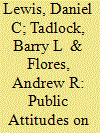

|
|
|
|
|
| Summary/Abstract |
Policy regarding the inclusion of transgender soldiers in the U.S. Military has shifted back and forth in recent years, with public opinion likely a significant factor shaping the eventual policy outcome. As such, this study examines the factors that shape public attitudes toward military service by transgender people. In particular, we examine the influence of sex, social gender roles, and attitudes toward gender in shaping transgender military service attitudes. Further, we hypothesize that personal experiences with the military and with transgender people, along with values, personality predispositions, and religion, are likely to influence individual attitudes. We test these hypotheses using data from a unique October 2015 national survey of American adults. The results suggest that personal experiences, attitudes toward gender roles, and religion have substantial but sometimes conditional effects on attitudes toward military service by transgender people.
|
|
|
|
|
|
|
|
|
|
|
|
|
|
|
|
| 8 |
ID:
178252
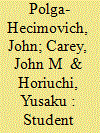

|
|
|
|
|
| Summary/Abstract |
Although the value of diversity—in terms of race, ethnicity, gender, and socioeconomic status—to the U.S. military has been subject to debate, preferences for diversity at educational institutions for the military officers are rarely examined systematically. To address this, we investigate whether midshipmen at the U.S. Naval Academy favor prioritizing diversity in student admissions and faculty recruitment using conjoint analysis, a method suited for estimating attitudes on sensitive and politicized issues. The results show strong preferences in favor of applicants from disadvantaged socioeconomic backgrounds and moderate but still positive preferences for members of traditionally underrepresented racial/ethnic groups in both admissions and faculty recruitment. Midshipmen’s preferences with respect to gender are, however, less straightforward. In particular, we find a strong negative preference against gender nonbinary applicants and candidates. Our findings suggest that midshipmen’s attitudes reflect both resolved and unresolved debates that resonate throughout the armed forces.
|
|
|
|
|
|
|
|
|
|
|
|
|
|
|
|
|
|
|
|
|